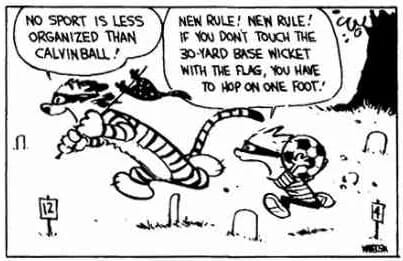Calvinball

Calvinball is the name of a fictional sport coined by cartoonist Bill Watterston in his syndicated comic strip Calvin and Hobbes. In the strip, Calvinball is a sport where the participants make up the rules as they go along. But the word has not remained within the confines of the comic and is now being used in other contexts where the “rules” are constantly changing.
Calvin and Hobbes ran from 1985–95. The strip centers around the imagination of a small boy, Calvin, and his stuffed tiger, Hobbes, who comes to life in Calvin’s imagination. Enormously popular and critically acclaimed, the comic strip is recognized as one of the greatest of the genre. Calvinball first appeared in the 5 May 1990 strip.
True to its nature, Calvinball could not be restricted by artificial boundaries and broke free of the strip with blinding speed. Use of the word appears in an October 1990 article by Lars T. Lih on Russian politics during the collapse of the Soviet Union:
Several years ago Sovietologist Robert Tucker wrote that “history is on the move again in the Soviet Union”; today, history has been galloping at a frantic pace. Outside observers could not figure out the new rules of the game—but then, neither could the players themselves. Soviet politics seems to be a form of Bill Watterson’s Calvinball, where the only rule is that the same rules are never used twice.
And by 1994 it was appearing without explanatory reference to the comic. From a book by Travis A. Haskins published that year that uses Calvinball in a sports context:
“There'll be a team championship and an individual championship,” he pronounced, resorting to Calvinball procedures to preserve his chances for victory. “The individual champ will be the one with the lowest point total for the two games. The scorekeeper will have to keep team totals and individual totals.”
And by early in the new century, Calvinball was being used both outside of the context of sports and without reference to the comic strip, indicating the concept was firmly embedded in the popular imagination. There is this by Phillipe Duhart in the September 2003 alternative zine Destroy All Monthly about the recall of Gray Davis that would eventually put Arnold Schwarzenegger in the California governor’s mansion:
How is it that the employment of paid-by-the-signature petition-gatherers by a millionaire with gubernatorial aspirations defined as a grassroots, populist movement? Gray Davis has dubbed this recall a “right-wing conspiracy.” In examining the recent shenanigans of Republicans in manipulating and undoing elections—i.e. the Clinton impeachment, the 2000 Florida election debacle, and this year's quasi-legal gerrymandering in Texas—it does seem that the Right is playing “Calvinball” with the Democratic system. But the voters will triumph in the end. And Schwarzenegger will be our governor. That's the degree of faith I have in the electorate.
Sources:
Duhart, Phillipe. “Who Are You to Accuse Me?” Destroy All Monthly, September 2003, 86/1. Archive.org.
Haskins, Travis A. Darin: A Soulprint. Orange, California: Soulprint, 1994, 122. Archive.org.
Lih, Lars T. “Soviet Politics: Breakdown or Renewal?” Current History, 89:549, October 1990. 309–12 at 309/1. JSTOR.
Oxford English Dictionary Online, March 2025, s.v. Calvinball, n.
Watterston, Bill. Calvin and Hobbes. Andrews McMeel Publishing. 5 May 1990.
Image credit: Bill Watterston/Andrew McMeel Publishing, 1990. Fair use of a low-resolution copy to illustrate the topic under discussion.